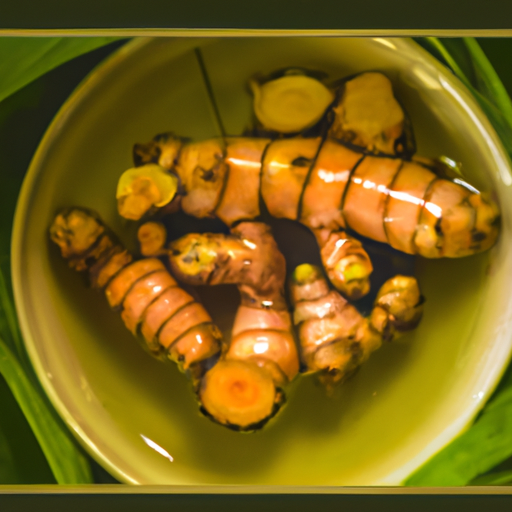As a person who appreciates the power of natural treatments and the philosophy of holistic health, I’ve recently come to recognize the numerous advantages offered by ginger and turmeric tea.
This warm and comforting beverage has been used for centuries in traditional medicine to treat a variety of ailments, from indigestion to inflammation.
Both ginger and turmeric are root plants that have powerful anti-inflammatory properties as well as a host of other health benefits.
Ginger is known for its ability to soothe upset stomachs, reduce nausea, and relieve pain.
Turmeric is often touted as a superfood due to its high antioxidant content, which can help fight free radicals in the body and protect against chronic diseases such as cancer and Alzheimer’s disease.
Together, these two roots make a potent combination that can improve immune function, boost brain function, and alleviate pain throughout the body.
In this article, we will explore what exactly makes ginger and turmeric tea so beneficial for our health and how you can start incorporating it into your daily routine.
Key Takeaways
- Ginger and turmeric tea has powerful anti-inflammatory properties that can benefit those with conditions such as arthritis or irritable bowel syndrome.
- Ginger and turmeric tea can improve digestion, boost immune function, and support brain function.
- Regular intake of ginger and turmeric tea can protect against chronic diseases such as cancer, heart disease, and diabetes.
- Ginger and turmeric tea can be easily made at home by boiling fresh or dried ginger root and turmeric powder in water, and can be customized with additional spices or sweeteners.
Overview of Ginger and Turmeric Tea
If you’re looking for a warm and comforting beverage that also has numerous health benefits, look no further than ginger and turmeric tea! This tea is made by steeping fresh or dried ginger root and turmeric powder in hot water.
Ginger is a root that’s been used for centuries as a natural remedy for digestive issues, inflammation, and nausea. Turmeric is another root that contains the compound curcumin, which has anti-inflammatory properties.
The health benefits of ginger and turmeric tea are numerous. Ginger can help to reduce inflammation in the body, which can be beneficial for those with arthritis or other inflammatory conditions. It may also help to alleviate nausea and improve digestion.
Turmeric has been shown to have anti-inflammatory effects as well, making it useful for conditions such as rheumatoid arthritis. Additionally, curcumin has antioxidant properties that may protect against cellular damage.
There are many recipe ideas for ginger and turmeric tea. To make a basic version of this tea, simply peel and slice fresh ginger root and add it to hot water along with some turmeric powder. You can also add other ingredients such as honey or lemon juice to taste. Experiment with different ratios of ginger to turmeric until you find the perfect balance for your taste buds!
With all these health benefits in one cup, who wouldn’t want to try this delicious beverage? Now let’s dive into the specific health benefits of ginger itself!
Ginger’s Health Benefits
You’ll be amazed at how much your immune system will thank you for drinking this warm, spicy elixir. Ginger tea has been used as a natural remedy for centuries due to its numerous health benefits. Not only is it a delicious and soothing beverage, but it also has antibacterial and anti-inflammatory properties that can help improve overall health.
One of the key benefits of ginger tea is its ability to boost the immune system. It contains high levels of antioxidants which help fight off harmful free radicals in the body, reducing inflammation and preventing illnesses such as colds and flu. Additionally, ginger tea can aid digestion by promoting healthy gut bacteria and reducing bloating or nausea.
If you’re looking for a natural way to improve your skin’s appearance, look no further than ginger tea! The antioxidants found in ginger can help prevent signs of aging by promoting collagen production. You can even incorporate ginger into your skincare routine with homemade face masks or toners made from grated ginger root. Try experimenting with different ginger tea recipes or adding fresh ginger to soups and stir-fries for an extra boost of flavor and health benefits.
As beneficial as ginger is on its own, combining it with turmeric creates a powerhouse duo that can pack even more health benefits. Turmeric’s active ingredient curcumin has been shown to have anti-inflammatory effects in the body, making it useful in treating conditions such as arthritis or irritable bowel syndrome. Stay tuned to learn more about turmeric’s health benefits!
Turmeric’s Health Benefits
Turmeric is a powerful anti-inflammatory agent that can improve conditions such as arthritis and irritable bowel syndrome. The active ingredient in turmeric, curcumin, has been shown to reduce inflammation by targeting multiple pathways in the body. Arthritis sufferers have reported reduced pain and stiffness after consuming turmeric regularly.
Additionally, studies have found that curcumin may have positive effects on heart health by reducing inflammation and improving endothelial function. In addition to its anti-inflammatory properties, turmeric has also been shown to have antioxidant effects. Antioxidants are important for protecting our cells from damage caused by free radicals, which can contribute to aging and disease.
Consuming turmeric regularly may help protect against oxidative stress and potentially reduce the risk of chronic diseases such as cancer. Overall, incorporating turmeric into one’s diet can have numerous health benefits. From reducing inflammation associated with conditions like arthritis and IBS to potentially improving heart health through its antioxidant properties, there are many reasons why this spice should be included in a healthy eating plan.
Next, let’s explore how ginger and turmeric work together to enhance these benefits even further.
How Ginger and Turmeric Work Together
Combining ginger and turmeric in your diet can maximize the health benefits of both ingredients. Not only do they bring a unique flavor to dishes, but they also have numerous health benefits when consumed together.
Ginger is known for its anti-inflammatory properties while turmeric is rich in antioxidants. Together, they create a powerful combination that can help improve digestion, reduce inflammation, and boost immunity.
Benefits of combining ginger and turmeric in cooking are plenty. The great thing about these two ingredients is that they complement each other’s flavors well. Adding grated or powdered ginger to turmeric-based dishes such as curry or stir-fries can enhance the overall taste while providing additional health benefits.
Another way to incorporate them into your daily diet is by steeping fresh ginger and turmeric roots into hot water for a soothing tea that can be enjoyed any time of day.
Incorporating ginger and turmeric into your diet has many potential health benefits when consumed together. These two natural ingredients work synergistically to provide an array of anti-inflammatory properties that can help protect against various diseases and conditions.
In the next section, we’ll explore more about their anti-inflammatory properties and how they affect our bodies’ overall health.
Anti-inflammatory Properties
By reducing the fire that fuels inflammation, ginger and turmeric work together like a soothing balm to calm our bodies’ internal storms. These two spices have been used for centuries in traditional medicine to treat various ailments, including inflammation. What makes them so effective is their anti-inflammatory properties. Ginger contains gingerols and shogaols that have been shown to reduce inflammatory markers in the body, while turmeric’s active ingredient curcumin has potent anti-inflammatory effects.
To understand how ginger and turmeric work together as herbal remedies, let’s take a closer look at their anti-inflammatory properties. Inflammation is your body’s natural response to injury or infection, but chronic inflammation can lead to various health problems such as heart disease and cancer. The good news is that there are many anti-inflammatory recipes you can make using these spices. For example, a simple tea made with fresh ginger root and ground turmeric can help reduce inflammation throughout the body.
Here’s a table that compares the anti-inflammatory properties of ginger and turmeric:
| Spice | Active Ingredient | Anti-Inflammatory Properties |
|---|---|---|
| Ginger | Gingerols and Shogaols | Reduces inflammatory markers |
| Turmeric | Curcumin | Potent anti-inflammatory effects |
Incorporating more ginger and turmeric into your diet can provide numerous health benefits beyond just reducing inflammation. In the next section, we will explore how these spices can aid in digestion.
Digestive Benefits
If you’re looking to improve your digestive health, incorporating ginger and turmeric into your diet may be beneficial. Both of these spices have been traditionally used in Ayurvedic medicine for centuries due to their anti-inflammatory properties.
The active compounds found in these spices, such as gingerol and curcumin, can help reduce gut inflammation and promote better digestion. Ginger has been shown to alleviate symptoms of indigestion, nausea, and vomiting. It increases the production of digestive enzymes and helps move food through the stomach more quickly.
Turmeric, on the other hand, can aid in reducing bloating and gas by stimulating bile production which helps break down fats in the body. These two spices work together to soothe gastrointestinal discomforts while also promoting overall digestive health.
In addition to aiding digestion, ginger and turmeric also have immune-boosting properties that can further improve your overall well-being. By reducing gut inflammation and supporting healthy digestion, these spices allow your body to absorb essential nutrients more efficiently which is critical for a strong immune system.
So start incorporating ginger and turmeric into your daily routine today for a healthier gut and stronger immune system!
Immune System Boost
You hold the key to a stronger immune system, so unlock its potential with the help of these powerful spices. Ginger and turmeric tea is known for its immune-boosting properties that can help keep illnesses at bay. The two spices contain compounds that have antioxidant and anti-inflammatory effects on the body.
To make a delicious ginger and turmeric tea, all you need is fresh ginger root, fresh turmeric root, water, and honey. Simply boil water in a pot and add sliced ginger and turmeric roots. Let it simmer for 10-15 minutes or until fragrant. Strain out the solids and sweeten with honey to taste. Drink this tea regularly to support your immune system.
While there is no recommended dosage for ginger and turmeric tea specifically, studies suggest that consuming up to 3 grams of ginger per day may be beneficial for overall health. However, always consult with your healthcare provider before incorporating any new supplements or herbs into your routine.
With regular intake of this powerful tea recipe, you can unlock its full potential to boost your immunity naturally. By nourishing our immune system with natural remedies like ginger and turmeric tea, we’re also supporting our brain function improvement as well as promoting overall wellness in our bodies.
Brain Function Improvement
After learning about how ginger and turmeric tea can boost our immune system, let’s now delve into its potential benefits for brain function improvement.
As we age, it’s natural for our memory and cognitive performance to decline. However, studies suggest that consuming ginger and turmeric tea may help enhance memory and cognitive function.
Gingerol and curcumin are the active compounds found in ginger and turmeric, respectively. These compounds have anti-inflammatory properties that protect brain cells from damage caused by inflammation. Moreover, they increase the production of neurotrophic factors that promote the growth of new brain cells, leading to better brain function.
In addition to these effects on the brain, ginger and turmeric tea may also improve mood and reduce anxiety levels. This is because these ingredients have been shown to increase serotonin levels in the brain – a neurotransmitter known as the ‘feel-good’ chemical. By improving both physical health and mental well-being, drinking ginger and turmeric tea regularly can lead to an overall healthier lifestyle.
It’s important to note that there are still more advantages of consuming this powerful beverage. Transitioning into other health benefits, without using ‘step’.
Other Health Benefits
Let’s explore some of the additional health benefits that can be gained from regularly consuming this delicious and powerful beverage. Ginger and turmeric tea isn’t just great for improving brain function, but it also has other amazing health benefits. Here are three sub-lists of these benefits:
-
Stress relief: If you’re feeling stressed or anxious, a cup of ginger and turmeric tea can help calm your nerves. The compounds found in ginger and turmeric have been shown to reduce cortisol levels in the body, which helps alleviate stress. Additionally, the warm and soothing properties of the tea make it a perfect drink for relaxation.
-
Weight loss: Ginger and turmeric both have natural anti-inflammatory properties that help boost metabolism and aid in weight loss. Drinking ginger and turmeric tea regularly can assist in reducing belly fat by increasing feelings of fullness, making you less likely to overeat throughout the day.
-
Other health benefits: Ginger and turmeric have potent anti-inflammatory effects that can help reduce joint pain caused by osteoarthritis or rheumatoid arthritis. They also contain antioxidants that protect against chronic diseases such as cancer, heart disease, and diabetes.
If you want to reap these amazing health benefits while enjoying a delicious cup of tea at home, here’s how to make ginger and turmeric tea at home… [transition into the next section].
How to Make Ginger and Turmeric Tea at Home
Now that we’ve explored some of the other health benefits of ginger and turmeric tea, let’s talk about how you can make it at home. This is my favorite way to enjoy this powerful drink because I have control over the ingredients and can customize the flavor to my liking.
To make ginger and turmeric tea, you’ll need fresh ginger root, fresh turmeric root, water, honey (optional), and any additional spices or herbs you’d like to add for flavor. Start by washing and peeling the roots, then slicing them thinly. Add them to a pot with water and bring to a boil. Reduce heat and let simmer for 15-20 minutes.
Strain out the roots and add honey or other sweeteners if desired. One of my favorite things about making this tea at home is that there are so many ways to change up the flavor. Try adding cinnamon sticks, cardamom pods, black pepper, or even lemon juice for an extra zing. Get creative with your combinations until you find your perfect cup of ginger and turmeric tea!
Frequently Asked Questions
Is it safe to consume ginger and turmeric tea every day?
I personally consume ginger and turmeric tea every day, as I find it to be a tasty and refreshing way to start my morning. However, it’s important to note that there are potential long term effects and interactions with medication that should be considered before making this a daily habit.
According to a study published in the Journal of Medicinal Food, consuming ginger and turmeric regularly may have beneficial effects on inflammation, blood sugar control, and digestion. However, excessive consumption may lead to gastrointestinal issues such as heartburn or diarrhea.
Additionally, both ginger and turmeric have blood-thinning properties which can interact with certain medications such as blood thinners or aspirin. It’s always best to consult with a healthcare provider before incorporating any new supplements or herbs into your daily routine.
Can ginger and turmeric tea help with weight loss?
I’ve found that drinking ginger and turmeric tea can provide weight loss benefits by boosting the metabolism. The active compounds in both ginger and turmeric have been shown to increase thermogenesis, which is the process of burning calories to produce heat.
Additionally, these spices have anti-inflammatory properties that can help reduce bloating and aid digestion, leading to a flatter stomach. While there isn’t a magic solution for weight loss, incorporating ginger and turmeric tea into your daily routine can be a natural way to support your goals.
It’s important to note that no single food or drink can guarantee weight loss on its own, but maintaining a balanced diet and exercise routine alongside consuming this tea may lead to positive results over time.
Is there a recommended dosage for ginger and turmeric tea?
When it comes to taking ginger and turmeric tea, there’s a recommended dosage to follow. It’s important to note that the optimal amount of these herbs can vary depending on factors like age, weight, and overall health.
For instance, some studies suggest that consuming up to 3 grams of ginger per day can be beneficial for reducing nausea and inflammation. Meanwhile, turmeric may be effective at doses as high as 8 grams per day for treating conditions like osteoarthritis and depression.
However, it’s essential to consult with a healthcare professional before beginning any new supplement or herbal regimen. While these spices have been shown to offer numerous health benefits when consumed in moderation, taking too much of either one could lead to potential risks like digestive issues or blood thinning effects.
Does adding honey or lemon to ginger and turmeric tea affect its health benefits?
When it comes to adding honey or lemon to ginger and turmeric tea, I personally prefer to add a drizzle of honey for its natural sweetness. However, both honey and lemon can enhance the flavor profile of the tea and provide additional health benefits beyond the spices themselves.
Honey is a natural antibacterial and anti-inflammatory agent that can help soothe sore throats and promote wound healing. Lemon, on the other hand, is rich in vitamin C which supports immune function and has detoxifying properties.
Ultimately, incorporating these ingredients into your tea routine can add an extra layer of wellness to your daily routine.
Are there any potential side effects of consuming ginger and turmeric tea?
When it comes to ginger and turmeric tea, there are some potential side effects that you should be aware of. While these two ingredients are generally considered safe for most people, consuming large amounts of either one can lead to gastrointestinal issues such as bloating, gas, and diarrhea.
It’s also important to note that ginger can interact with certain medications, including blood thinners and medications used to treat diabetes. If you’re taking any prescription medications or have a pre-existing medical condition, it’s always a good idea to talk to your doctor before incorporating ginger and turmeric tea into your daily routine.
Additionally, while there isn’t much research on the long-term effects of drinking this tea regularly, it’s always wise to practice moderation when it comes to any food or supplement.
Conclusion
Overall, I highly recommend incorporating ginger and turmeric tea into your daily routine. Not only is it a delicious and comforting beverage, but it also provides numerous health benefits.
Personally, I’ve noticed a significant improvement in my digestion and overall immune system since starting to drink this tea regularly. One metaphor that comes to mind when thinking about the effects of ginger and turmeric tea is that of a shield.
Just as a shield protects us from harm, the anti-inflammatory and immune-boosting properties of these two ingredients work together to protect our bodies from various illnesses and ailments. It’s like having an extra layer of defense against whatever life may throw our way.
So why not give it a try? Your body’ll thank you for it.










